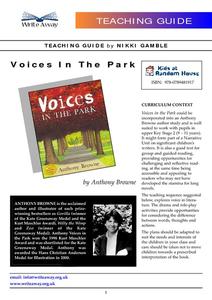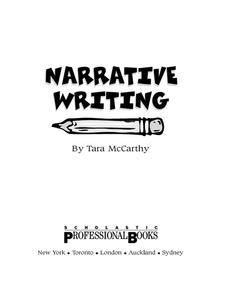Write Away!
Voices In the Park
Explore the impact a narrator's point of view has on a story with a reading of the children's book, Voices in the Park by Anthony Browne. Written in four different voices, the story is told and retold from different perspectives to...
National Endowment for the Humanities
Narrative Voice in Moby Dick
Call him a reliable narrator! Ishmael is the focus of a lesson that asks readers to analyze the complex character of Herman Melville's narrator as he is introduced in the first chapter of Moby Dick.
E Reading Worksheets
Tone: Voice of the Speaker
Tone and mood are easy to use interchangeably—and yet they are very different elements of literature. Help middle schoolers discern between the way a speaker feels about his or her subject and the way the audience is meant to feel with a...
Middle School Computer Projects
Timeline of Your Life
Pupils can use PowerPoint as a tool to create clear timelines that show their lives in relationship to historical events. Take a trip to the computer lab and share this page with your class. Class members can watch each video and follow...
Kansas Poets
Persona Poem
Young poets are asked to craft a poem in the voice of a first person narrator, a dramatic monologue of sorts, that reveals not only a dramatic situation but something of the narrator's character as well.
National Endowment for the Humanities
Literary Genres in “Moby-Dick”
Moby Dick is more than a whale of a tale narrated by Ishmael. A lesson studying Herman Melville's classic novel asks readers to examine the different genres the author weaves into his story. Instructors model how to conduct a stylistic...
Facing History and Ourselves
Why Little Things Are Big
Often our decisions are impacted by a fear of how others see us. That's the big idea in a two-day lesson that asks how false assumptions, how our fear of how others may see us, impact how we act. After watching a video about such a...
Museum of the Moving Image
Understanding the Language of Political Ads
The verbal techniques and emotional appeals contained in the language used in political ads plays a vital role in creating the impact of the ad. As class members continue their study of Presidential campaign commercials from 1952–2012,...
Scholastic
Narrative Writing
If you're looking to start a unit based around narrative writing, make sure to consider this resource while you're planning. This book covers five topics: writing personal narratives, writing narratives about others, writing narratives...
Curated OER
Love That Dog and Hate That Cat Teacher's Guide
This teaching guide for Love That Dog and Hate That Cat includes suggestions for how to integrate Sharon Creech's books into a poetry unit, as well as writing activities, discussion questions, and tips for making poetry accessible to all...
Library Sparks
When Marian Sang: Reader's Theater
Put on an eight-actor show based on Pan Munoz Ryan's When Marian Sang: The True Recital of Marian Anderson. The resource comes with a color-coded script that includes some images from the picture book.
Curated OER
Poetic Elements
Poetry is all about sound and rhythm. The sound of the words, the rhythm of the lines, and the emotional atmosphere created by these elements and the literary devices poets use, compress whole stories into a few stanzas. The specialized...













